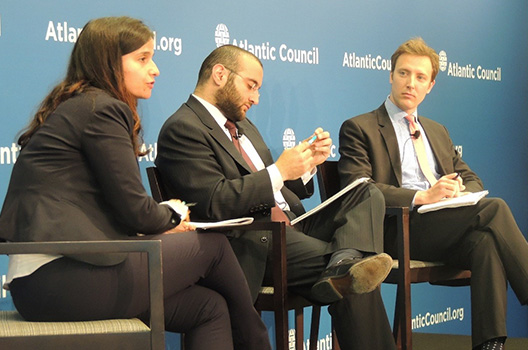 On May 11, 2016 the Atlantic Council’s Rafik Hariri Center for the Middle East launched the issue brief “Turkey’s Syria Predicament” and hosted a discussion with co-authors and Hariri Center senior fellows Faysal Itani and Aaron Stein. Joyce Karam, Washington Bureau Chief for Al-Hayat Newspaper and columnist for Al-Arabiya, moderated the event. Hariri Center Director, Ambassador Frederic C. Hof, provided opening remarks.
On May 11, 2016 the Atlantic Council’s Rafik Hariri Center for the Middle East launched the issue brief “Turkey’s Syria Predicament” and hosted a discussion with co-authors and Hariri Center senior fellows Faysal Itani and Aaron Stein. Joyce Karam, Washington Bureau Chief for Al-Hayat Newspaper and columnist for Al-Arabiya, moderated the event. Hariri Center Director, Ambassador Frederic C. Hof, provided opening remarks.
Hof opened the discussion by noting that Turkey had a lot at stake when the Syrian conflict first began in March 2011. At the time, Turkish diplomats said there was a need to establish a safe zone for the 25,000 Syrians that had fled to Turkey. Now there are 2.5 million Syrians in Turkey. Hof explains that in this issue brief, Itani and Stein present serious answers to what Turkey has been doing to get what it wants, its report card to date, and what options are open to our NATO ally going forward.
Karam opened the discussion by acknowledging that Turkey went from a zero problem policy in Syria, to infinite problems within its own country. Karam emphasized the timeliness of the day’s discussion given a heated Turkey-Syria border, an increased ISIS presence, and a power struggle within Turkey. Karam posed questions on the current and future US policies towards Turkey, and Turkey’s current domestic political problems and options moving forward.
Itani explained that the US policy in Syria has been unclear except for the issues of US disengagement in the region and the fight against the Islamic State (ISIS or ISIL). Taking issues in isolation is problematic to the Syrian civil war, the Kurdish issue as an example, and has caused US interests to diverge from those of Turkey. Stein, however, did indicate that there is an assumption of greater convergence of interests for the next US administration.
Stein emphasized the need to militarily get rid of ISIS due to the threat it poses to Turkey, such as recent suicide bombs by ISIS supporters. He highlighted a few key issues with the current circumstances: Focusing on ISIS, in isolation, is not defeating the problem. Further, the Russian air presence, including an airbase in Syria, risks a confrontation, which is not in anyone’s best interest. He noted that the Russian intervention has escalated and changed the situation in Syria. Stein also described the recent resignation of Turkish Prime Minister Ahmet Davutoglu as the first step in a long campaign to rebuild support for the Turkish president towards large scale change.
Itani explained that during the conflict Qatar and the Gulf states have provided significant support to the insurgency, whereas Turkey has played a more passive role. Turkey has focused on developing supply lines in and out of Syria.
Itani and Stein presented a policy recommendation focused on the Manbij pocket. They recommended that Turkish forces enter the Manbij pocket, with US-led coalition support, to push ISIS from this area. Turkish failure to previously control the border had created an impression that Turkey supports ISIS, and this direct action against the extremist group would dissolve these allegations. The authors acknowledged that risks include confrontation with Russia, the regime, or the Kurdish Democratic Union Party (PYD). Whatever the outcome, the authors assert that Turkey will continue to be heavily involved in the conflict and ultimately the rebuilding of Syria.
